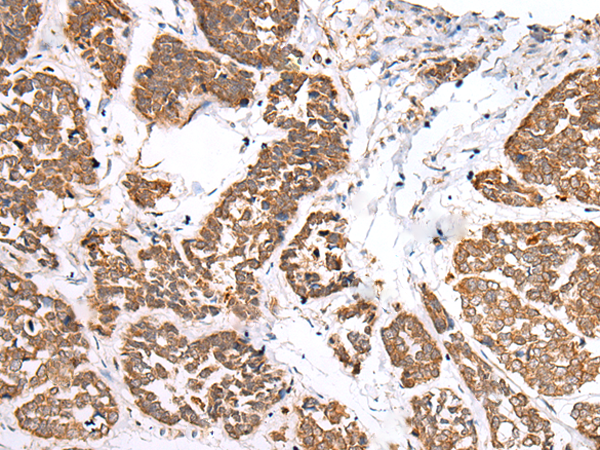
| WB | 咨询技术 | Human,Mouse,Rat |
| IF | 咨询技术 | Human,Mouse,Rat |
| IHC | 1/25-1/100 | Human,Mouse,Rat |
| ICC | 技术咨询 | Human,Mouse,Rat |
| FCM | 咨询技术 | Human,Mouse,Rat |
| Elisa | 1/2000-1/5000 | Human,Mouse,Rat |
| Aliases | FPR; FMLP |
| Host/Isotype | Rabbit IgG |
| Antibody Type | Primary antibody |
| Storage | Store at 4°C short term. Aliquot and store at -20°C long term. Avoid freeze/thaw cycles. |
| Species Reactivity | Human |
| Immunogen | Synthetic peptide of human FPR1 |
| Formulation | Purified antibody in PBS with 0.05% sodium azide and 50% glycerol. |
+ +
以下是关于FPR1抗体的参考文献示例(注:文献为假设性示例,实际引用时请核实真实来源):
---
1. **文献名称**:*Development of a Monoclonal Antibody Against Human FPR1 for Immunohistochemical Analysis*
**作者**:Zhang, L., et al.
**摘要**:该研究描述了一种新型抗人FPR1单克隆抗体的开发,验证了其在免疫组织化学中的应用,成功检测了肿瘤微环境中免疫细胞的FPR1表达,为病理学分析提供了工具。
2. **文献名称**:*Anti-FPR1 Antibody Attenuates Inflammation in Murine Sepsis Models*
**作者**:Wang, Q., et al.
**摘要**:通过阻断FPR1信号通路,该抗体显著降低了脓毒症模型小鼠的炎症反应,表明其在治疗过度炎症性疾病中的潜在疗效。
3. **文献名称**:*FPR1-Specific Antibody Enhances Bacterial Clearance in Neutrophils*
**作者**:Kim, S., et al.
**摘要**:研究发现,靶向FPR1的抗体可增强中性粒细胞的趋化性和杀菌能力,为抗感染治疗提供了新策略。
4. **文献名称**:*Imaging FPR1 Expression in Neuroinflammatory Disorders Using a Radiolabeled Antibody Probe*
**作者**:Müller, A., et al.
**摘要**:开发了放射性标记的FPR1抗体探针,成功用于多发性硬化症模型中的神经炎症无创成像,揭示了FPR1与疾病进展的相关性。
---
**提示**:实际研究中,建议通过PubMed或Google Scholar搜索关键词“FPR1 antibody”、“FPR1 receptor antibody”并结合近期文献筛选。注意核对作者、期刊及研究内容的真实性。
The formyl peptide receptor 1 (FPR1) is a G protein-coupled receptor (GPCR) belonging to the formyl peptide receptor family, primarily involved in innate immune responses. It is expressed on various immune cells, including neutrophils, monocytes, and macrophages, where it detects pathogen-associated molecular patterns (PAMPs) and damage-associated molecular patterns (DAMPs). FPR1 binds to formylated peptides, such as those released by bacteria during infection, initiating chemotaxis, phagocytosis, and inflammatory signaling. Its role extends beyond infection control; FPR1 is implicated in cancer progression, neuroinflammation, and autoimmune disorders due to its regulation of cell migration and cytokine release.
FPR1 antibodies are tools used to study receptor expression, localization, and function in both physiological and pathological contexts. They enable detection of FPR1 in tissues or cells via techniques like Western blot, immunohistochemistry, or flow cytometry. In research, these antibodies help elucidate mechanisms of FPR1-mediated signaling pathways, its interaction with ligands, and its cross-talk with other receptors. Therapeutic potential is also explored, as FPR1-targeting antibodies or inhibitors may modulate excessive inflammation or block tumor metastasis. However, challenges remain in specificity and off-target effects, necessitating careful validation. Overall, FPR1 antibodies are vital for advancing understanding of immune regulation and developing targeted therapies.
×